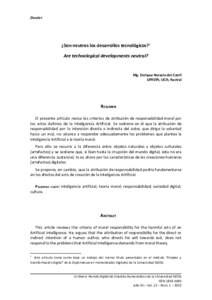Por favor, use este identificador para citar o enlazar este ítem:
https://repositorio.uca.edu.ar/handle/123456789/16337| Campo DC | Valor | Lengua/Idioma |
|---|---|---|
| dc.contributor.author | Carril, Enrique H. del | es |
| dc.date.accessioned | 2023-05-09T15:01:36Z | - |
| dc.date.available | 2023-05-09T15:01:36Z | - |
| dc.date.issued | 2022 | - |
| dc.identifier.citation | Carril, E. H. del. ¿Son neutros los desarrollos tecnológicos? [en línea]. In Itinere. 2022, 12 (1). Disponible en: https://repositorio.uca.edu.ar/handle/123456789/16337 | es |
| dc.identifier.issn | 1853-5585 (en línea) | - |
| dc.identifier.uri | https://repositorio.uca.edu.ar/handle/123456789/16337 | - |
| dc.description.abstract | Resumen: El presente artículo revisa los criterios de atribución de responsabilidad moral por los actos dañinos de la Inteligencia Artificial. Se sostiene en él que la atribución de responsabilidad por la intención directa o indirecta del autor, que dirige la voluntad hacia un mal, no alcanza a responder adecuadamente los problemas que plantea la Inteligencia Artificial a la teoría moral. Para ello se recurre a la diferencia entre objetos naturales y objetos culturales (artefactos) y se sostiene que, si bien hasta la irrupción del mundo digital, ésta no era una diferencia sustancial, lo es ahora por las características de las creaciones humanas (artefactos) digitales Se propone, en cambio, que la atribución de responsabilidad podría fundamentarse en los efectos del acto de creación de la Inteligencia Artificial. | es |
| dc.description.abstract | Abstract: This article reviews the criteria of moral responsibility for the harmful acts of an Artificial Intelligence. He argues that the attribution of responsibility for the direct or indirect intention of a human author, who directs his will towards evil, does not respond to the problems that Artificial Intelligence demands from moral theory. To argue this, the article explores the difference between natural objects and cultural objects (artifacts) and argues that, although until the development of the digital world, this was not a substantial difference, now it is. Instead, the article proposes that the attribution of moral responsibility could be based on the effects of the act of creation of Artificial Intelligence. | es |
| dc.format | application/pdf | es |
| dc.language.iso | spa | es |
| dc.publisher | Universidad FASTA. Vicerrectorado de Formación | es |
| dc.rights | Acceso abierto | * |
| dc.rights.uri | http://creativecommons.org/licenses/by-nc-sa/4.0/ | * |
| dc.source | In Itinere. 2022, 12 (1) | es |
| dc.subject | TEORIA DEL DERECHO | es |
| dc.subject | INTELIGENCIA ARTIFICIAL | es |
| dc.subject | MORAL | es |
| dc.subject | SOCIEDAD DIGITAL | es |
| dc.subject | RESPONSABILIDAD | es |
| dc.subject | CULTURA | es |
| dc.title | ¿Son neutros los desarrollos tecnológicos? | es |
| dc.title | Are technological developments neutral? | es |
| dc.type | Artículo | es |
| uca.disciplina | DERECHO | es |
| uca.issnrd | 1 | es |
| uca.affiliation | Fil: Carril, Enrique H. del. Universidad FASTA; Argentina | es |
| uca.affiliation | Fil: Carril, Enrique H. del. Pontificia Universidad Católica Argentina; Argentina | es |
| uca.affiliation | Fil: Carril, Enrique H. Universidad Austral; Argentina | es |
| uca.version | publishedVersion | es |
| item.fulltext | With Fulltext | - |
| item.languageiso639-1 | es | - |
| item.grantfulltext | open | - |
| Aparece en las colecciones: | Artículos | |
Ficheros en este ítem:
| Fichero | Descripción | Tamaño | Formato | |
|---|---|---|---|---|
| neutros-desarrollos-tecnológicos.pdf | 123,7 kB | Adobe PDF |  Visualizar/Abrir |
Visualizaciones de página(s)
95
comprobado en 27-abr-2024
Descarga(s)
44
comprobado en 27-abr-2024
Google ScholarTM
Ver en Google Scholar
Este ítem está sujeto a una Licencia Creative Commons

